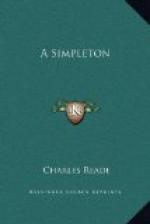“You treat me like a child—taking away my very puff.”
“I treat you like a beautiful flower, that no bad gardener shall wither whilst I am here.”
“What nonsense! How could that wither me? It is only violet powder—what they put on babies.”
“And who are the Herods that put it on babies?”
“Their own mothers, that love them ten times more than the fathers do.”
“And kill a hundred of them for one a man ever kills. Mothers!—the most wholesale homicides in the nation. We will examine your violet-powder: bring it down here.”
While she was gone he sent for a breakfast-cupful of flour, and when she came back he had his scales out, and begged her to put a teaspoonful of flour into one scale and of violet powder into another. The flour kicked the beam, as Homer expresses himself.
“Put another spoonful of flour.”
The one spoonful of violet powder outweighed the two of flour.
“Now,” said Staines, “does not that show you the presence of a mineral in your vegetable powder? I suppose they tell you it is made of white violets dried, and triturated in a diamond mill. Let us find out what metal it is. We need not go very deep into chemistry for that.” He then applied a simple test, and detected the presence of lead in large quantities. Then he lectured her: “Invisible perspiration is a process of nature necessary to health and to life. The skin is made porous for that purpose. You can kill anybody in an hour or two by closing the pores. A certain infallible ass, called Pope Leo XII., killed a little boy in two hours, by gilding him to adorn the pageant of his first procession as Pope. But what is death to the whole body must be injurious to a part. What madness, then, to clog the pores of so large and important a surface as the face, and check the invisible perspiration: how much more to insert lead into your system every day of your life; a cumulative poison, and one so deadly and so subtle, that the Sheffield file-cutters die in their prime, from merely hammering on a leaden anvil. And what do you gain by this suicidal habit? No plum has a sweeter bloom or more delicious texture than the skin of your young face; but this mineral filth hides that delicate texture, and substitutes a dry, uniform appearance, more like a certain kind of leprosy than health. Nature made your face the rival of peaches, roses, lilies; and you say, ’No; I know better than my Creator and my God; my face shall be like a dusty miller’s.’ Go into any flour-mill, and there you shall see men with faces exactly like your friend Miss Lucas’s. But before a miller goes to his sweetheart, he always washes his face. You ladies would never get a miller down to your level in brains. It is a miller’s dirty face our mono-maniacs of woman imitate, not the face a miller goes a-courting with.”
“La! what a fuss about nothing!”
“About nothing! Is your health nothing? Is your beauty nothing? Well, then, it will cost you nothing to promise me never to put powder on your face again.”




